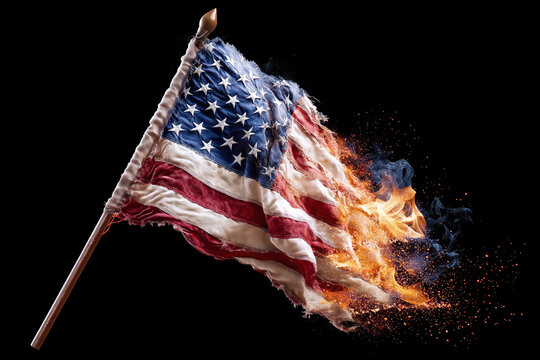
Recently, the word SCOTUS (The Supreme Court of the United States) has been the talk of the town on social media.
Residents from the United States and other parts of the country have come out to criticise, while others supported President Donald Trump’s flag-burning order.
This is after President Trump signed an executive order directing the prosecution of anyone who burns the American flag.
The order, issued on August 25, seeks to impose up to a one-year jail term on those who desecrate the flag
It also directs immigration authorities to revoke benefits for foreign nationals involved in such acts.
The move has triggered sharp debate, with legal experts warning that it collides head-on with established constitutional protections.
At the heart of the storm is the First Amendment. In 1989, the Supreme Court ruled in Texas v. Johnson that burning the American flag is a form of symbolic expression protected as free speech.
A year later, in United States v. Eichman, the Court reaffirmed that stance, striking down attempts to criminalise flag desecration.
Conservative jurist Antonin Scalia, who personally opposed flag burning, sided with the majority.
His remarks from 2012 have resurfaced, underscoring the tension between personal convictions and constitutional principles.
“If I were king, I might outlaw it. But under the Constitution, flag desecration is a symbol that expresses an idea,” Scalia once said.
Trump’s order now sets the stage for a fresh legal battle that could force the Court to revisit its precedent.
Critics argue the directive is unconstitutional, while supporters hail it as a patriotic stand.
A video seen by the Star shows a retired Army veteran burning a flag near the White House hours after the order was announced. He was later arrested by the police.
Civil liberties groups have condemned the move, calling it a direct assault on free expression.
Constitutional scholars also point out that an executive order cannot override a Supreme Court ruling.
“This order will almost certainly be tested in court,” one legal analyst said.
The clash has pushed SCOTUS into the national conversation, raising questions about how far executive power can stretch against constitutional protections.
For many, the issue is not about patriotism but about preserving the right to dissent.
As the debate intensifies, the American flag has once again become a powerful symbol, not just of national pride, but of the enduring struggle over the meaning of free speech in a divided nation.
On X, Citizens reacted to the directive. Teabagger of Libs said, “SCOTUS already ruled in 1989 that burning the flag is protected by the First Amendment. Freedom has tradeoffs. Please stop with the PR stunt Executive Orders.”
Stella Parton added, “Like many Americans who grew up in the sixties during the civil rights movement, I’m having difficulty watching our rights being taken away daily. The problem lies with the SCOTUS, Republicans and Christian Nationalists.”
DJL said, “SCOTUS already ruled on this, Texas v. Johnson (1989). Flag burning is protected speech under the First Amendment.”
“SCOTUS upheld flag burning as protected speech at least twice. This is not a route we want to go down as Americans. Its very essence is anti-American, and it cheapens what the flag stands for. I say this as somebody who would never burn the American flag,” The Redheaded Libertarian.











